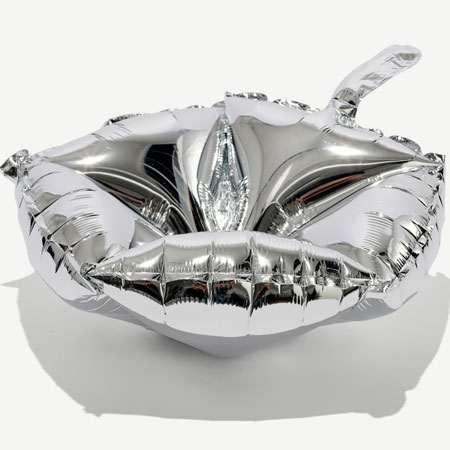
Mindcraft by Danish Crafts
Design organisation Danish Crafts presented the work of 12 Danish designers including Kim Buck (above), Ole Jensen, (below) and Christin Johansson at 100% Design London last month.
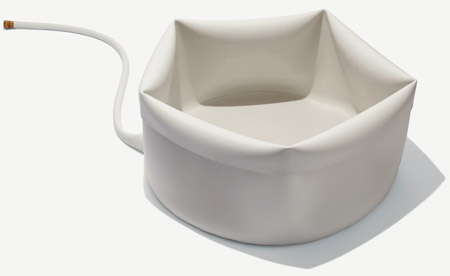
Called Mindcraft and presented at 100% Futures, the exhibition showcased Denmark's "leading and most talented designers and craftspeople". Below: Day_1 & Day_2,bed linen by Dorthe Agergaard Jensen
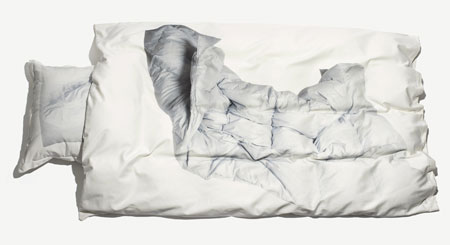
Below: Everyday Scenarios, porcelain figurines by Louise Hindsgavl
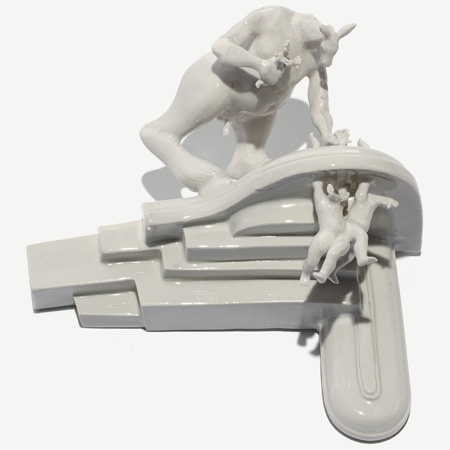
Below are descriptions of the pieces included in the show:
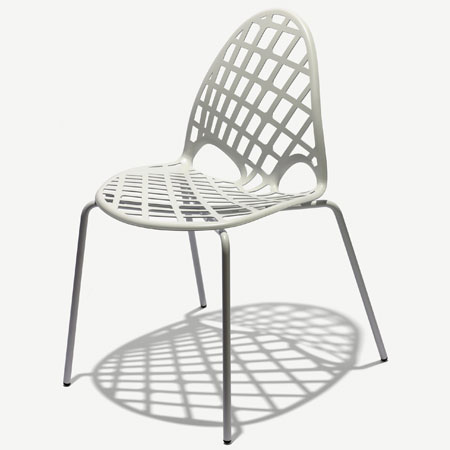
Above: Spiderwoman, stacking chair, 2008, by Louise Campbell, designer
Material: Pressed steel, steel tubes, powder-painted and cast plastic
Dimensions: 94 x 70 x 60 cm
Produced by: HAY
Statement:“There won’t be any puddles in this chair.”
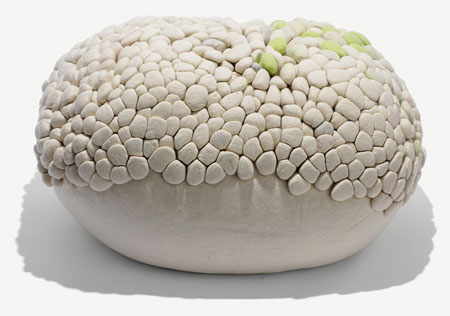
Above:
Textile Stone, 2008, by Pernelle Fagerlund, textile designer
Material: felted 100% pure new wool, polyester filling
Colours: white and green
Dimensions: 100 x 70 x 60 cm
Statement:
“I design three-dimensional textiles, which convey evocative and energy renewing sensations, stimulating the body in relaxation ‘situations’. Textiles are almost always inferior to the form; in my three-dimensional work, the textiles play the main part both as furniture and as textile. The third dimension is used to express the humorous, the vigorous, the playful – this type of furniture should appeal to pause and at the same time be a visual experience. I want to draw the expression towards something sculptural, sumptuous, unpretentious, funny, curious and voluminous.”
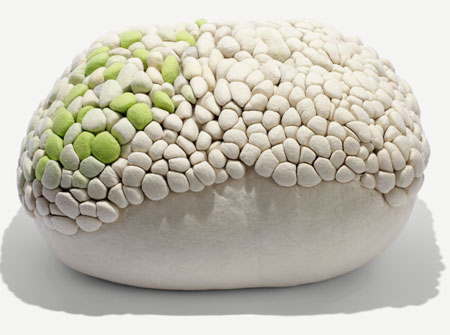
Below: Bistro Light, upholstered chair, 2007, by Ditte Hammerstrøm, designer
Materials: painted wood, foam rubber and plastic string
Colour: white
Dimensions: 76.5 x 30 x 52 cm
Produced by: Källemo AB for Thorsen Møbler
Statement:“Upholstered chair with slightly distorted proportions, which enable new ways of using the chair. The chairs are industrially made, but because of the upholstery process, each chair becomes unique.”
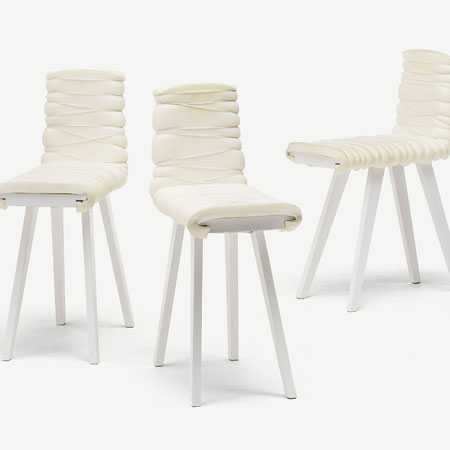
Below: Everyday Scenarios, porcelain figurines, 2008, by Louise Hindsgavl, ceramist
Material: porcelain
Colour: white
Dimensions: 27 x 15 x 30 cm
Statement: “I enjoy reinterpreting the porcelain figurine and studying the potential inherent in the genre. Through my work, I hope to be able to challenge stereotypes and spring the porcelain figurine from its perceptual pigeonhole. In my opinion, the genre of conversation pieces has a considerable untapped potential for world commentary. It is a ceramics genre with many virtues and pretty figurines in its weighty baggage. But the figurines are harmless, expressive of a pretty and idealised world. I would like to see this world in a different light.”
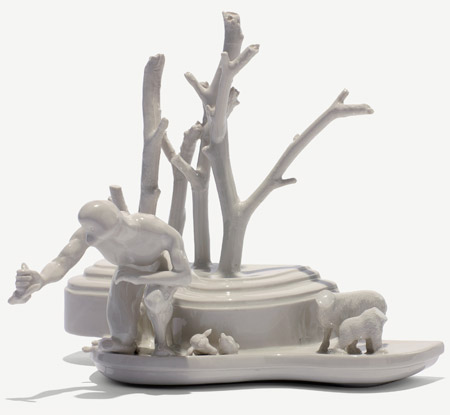
Below: Day_1 & Day_2,bed linen, 2008, by Dorthe Agergaard Jensen, MA (textile design)
Material: 100% cotton satin, digital print
Dimensions: 140 x 200 cm – 63 x 60 cm
Statement:“My vision is to narrate or describe an action from everyday life. A documentary exploration of the way the bed looks in the morning – the unmade bed. A rendition of reality in a new context, hopefully with a humorous touch. The motifs are photographs, because photography is a form that seems real and ensures a sense of recognizability. I aim to challenge the naturalist view, and through subjective choices I try to craft a narrative that highlights the function and appearance of the design.”
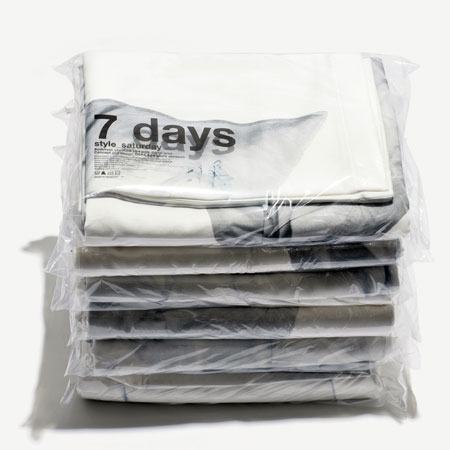
Below: Rubber Tub, 2008, by Ole Jensen, ceramist and designer
Materials: EPDM rubber, cork
Colour: white
Dimensions: 50 x 110 x 270 cm
Statement: ”A soft tub for the body. For children and adults. For play and healing. In the garden or the stylish bathroom.”
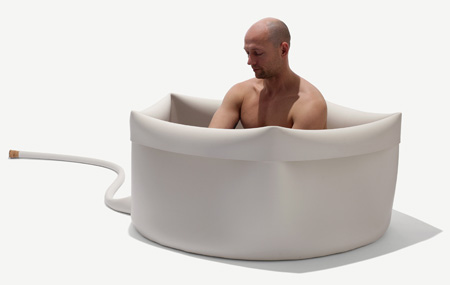
Below: Vaginal Mirror, 2008, by Christin Johansson, ceramist
Material: clay painted with car enamel
Colour: white
Dimensions: 50 x 40 x 20 cm
Statement:“My works emanate from a fascination of sterile, clinical environments and industrial sanitary designs. The objects are made with irony and humour to arouse curiosity about something as common as the bathroom and its elements. My works operate in the borderland between industrial design and fine arts, which in my opinion is one of the greatest strengths of crafts: the freedom to not necessarily be functional but to question and discuss function and design. This is an integral part of the ceramic tradition.”
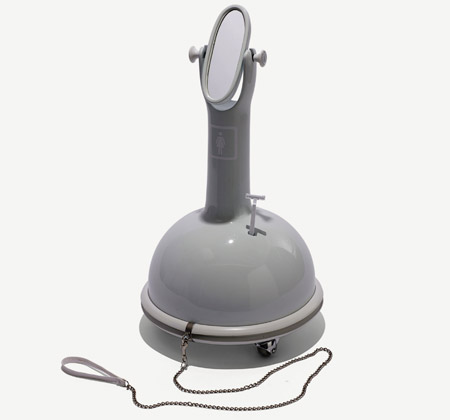
Below: Swirls, a lamp element, 2008, by Astrid Krogh, textile designer
Materials: neon, aluminium
Dimensions: 90 x 90 cm
Statement:“’Swirls’ is capable of growing, becoming a pattern, a plant, a rug on your wall. Swirls’ is a decorative wall-mounted lamp with a touch of function, which can consist of 1, 5, 13 or 300 elements”
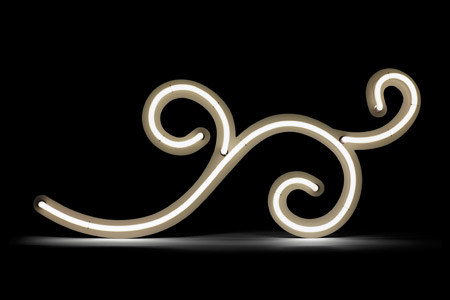
Below: Clothes Tree (2000/2008) by Cecilie Manz, designer MDD
Materials: solid ash wood, fittings
Dimensions: 120 x 110 x 95 cm
Produced by: PP Møbler
Statement:“A tree for your clothes. The clothes can be tossed casually or draped carefully, depending on your temperament.”
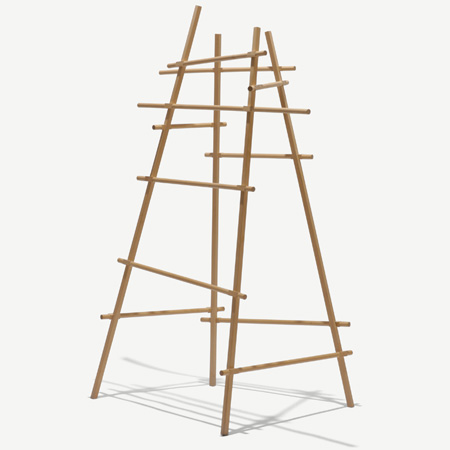
Below: Stilt #2, 2008, by Anders Ruhwald, ceramist
Materials: clay, painted steel and rubber
Colours: yellow and golden
Dimensions: 122 x 103 x 78 cm
Created at the National Workshops for Arts and Crafts, Copenhagen
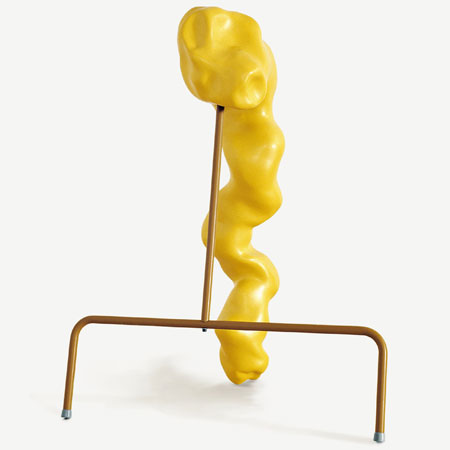
Below: Mega Happiness by Carolina Vallejo, jewellery designer
Materials: glass, silver, goldruby
Dimensions: Ø 10 x 12 cm
Statement: “Happiness: The feeling is an inner quality, an inner strength. Happiness can be maintained by protecting it, by protecting the virtues. If the opposite is the case, it will collapse. All external good things are without significance for good, true happiness.”
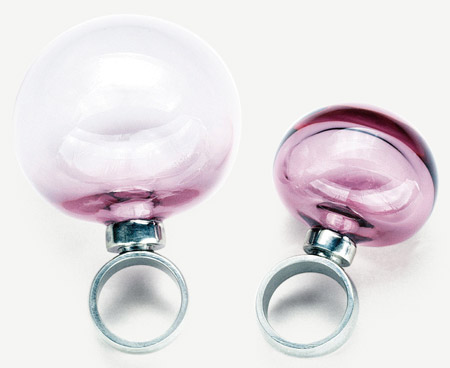

Above: Hollowware, inflatable objects, 2007, by Kim Buck, jeweller
Materials: metalized plastic foil
Dimensions: Ø 10 cm, 14 cm and 35 cm
Produced by: Kim Buck
Statement:“Hollowware is my comment on the perception of value in my trade. For generations, my trade has relied more on the monetary value of the materials than on artistic value. Many see jewellery and hollowware as investments in materials – gold, silver and precious stones. As an artist, I have used irony to distance myself from these mechanisms, insisting that the value of my works lies in their idea, design and execution.”
Below is some information from Danish Crafts:
--
Danish crafts and design are bursting with creative and intellectual zest these years, expressed in a wave of innovative design characterised by high artistic quality. The development from traditional crafts and applied art to innovative and conceptual design has enabled the international breakthrough and the strong position on the international design scene that Danish crafts and design are currently experiencing.
In recent years, Danish crafts and design have received a number of international honours and awards. In 2005, Danish crafts won the award for ”best craftsmanship” at the design fair ICFF in New York, in 2006 Danish crafts were profiled through a successful collaboration with MoMA, and a recent collaboration with the Danish furniture maker Fritz Hansen has paved the way for international success for the participating craftspeople.
A soft bathtub and a luminescent damask table cloth 12 of Denmark’s leading and most talented young craftspeople and designers are involved in the MINDCRAFT exhibition. The 12 craftspeople and designers are exponents of the development from HANDCRAFT to MINDCRAFT that is currently changing Danish crafts from an area that is predominantly concerned with materials, techniques and utilitarian value to a phenomenon in the field of tension between art, crafts and design. MINDCRAFT applies an expanded concept of crafts and a conceptual approach to the field, which is reflected in the individual works as well as in the exhibition design. With its 12 unique brand-new and artistic works, the exhibition offers a view of Danish crafts and
design right now.
This view includes digital bed linen, an inflatable bowl, a good-luck ring, aesthetic/grotesque figurines, a Styrofoam chair, a huge felt boulder, a luminescent damask table cloth, a soft bathtub, a ceramic rack, a clothes tree, a vaginal mirror, and a laser-cut chair.
The exhibition has been organized by Danish Crafts, which is an information centre under the Danish Ministry of Culture with the overall goal of highlighting, promoting and increasing turnover for Danish crafts in Denmark and abroad. The Danish architect Karen Kjærgaard is the exhibition curator and designer.
The 12 participating Danish designers are ceramicist Anders Ruhwald, ceramicist Christin Johansson, ceramicist Louise Hindsgavl, textile designer Pernelle Fagerlund, textile designer Astrid Krogh, textile designer Dorte Agergaard Jensen, furniture designer Louise Campbell, furniture designer Ditte Hammerstrøm, designer Cecilie Manz, designer Ole Jensen, goldsmith Kim Buck, and goldsmith Carolina Vallejo.
Internationally acknowledged designers in MINDCRAFT All the designers who have been selected for MINDCRAFT are internationally acknowledged.
Furniture designer Louise Campbell numbers the Italian furniture manufacturer Zanotta among her clients as well as several Danish manufacturers including Royal Copenhagen, Holmegaard, Louis Poulsen and Hay Cph.
Ceramicist Ole Jensen is world-renowned for his rubber washing-up bowl, which was launched by Danish Crafts, and which is now manufactured by Normann Copenhagen. The bowl is very successful throughout the world. Ole Jensen also designed the tableware Familia for Normann Copenhagen and the tableware Ole for Royal Copenhagen.
Designer Cecilie Manz designed the lamp Caravaggio for the Danish lighting manufacturer Light Years as well as the glass series Minima for Holmegaard.